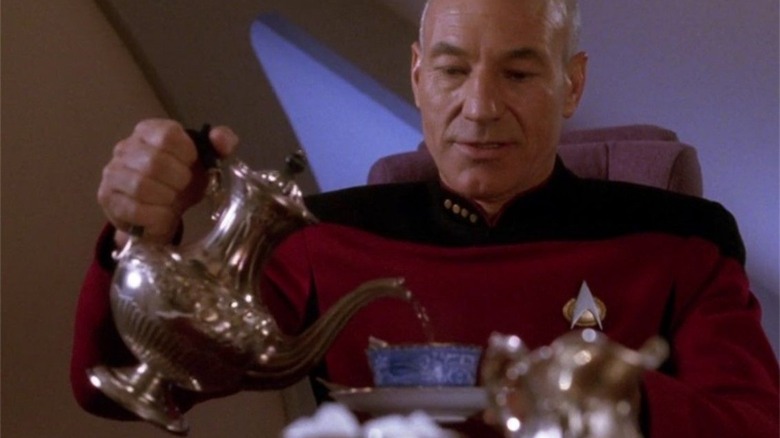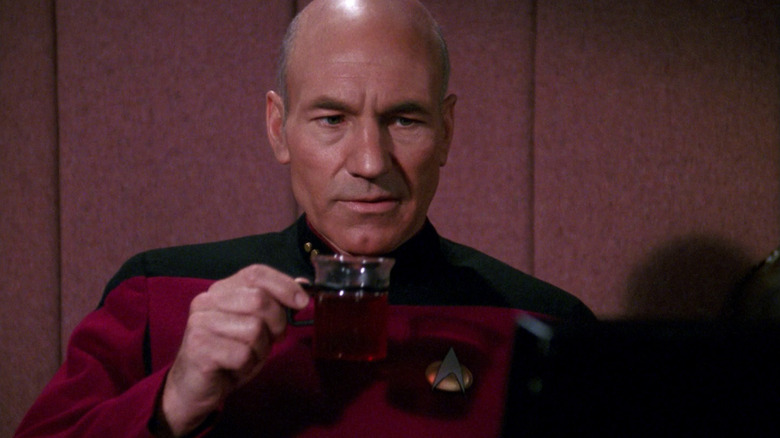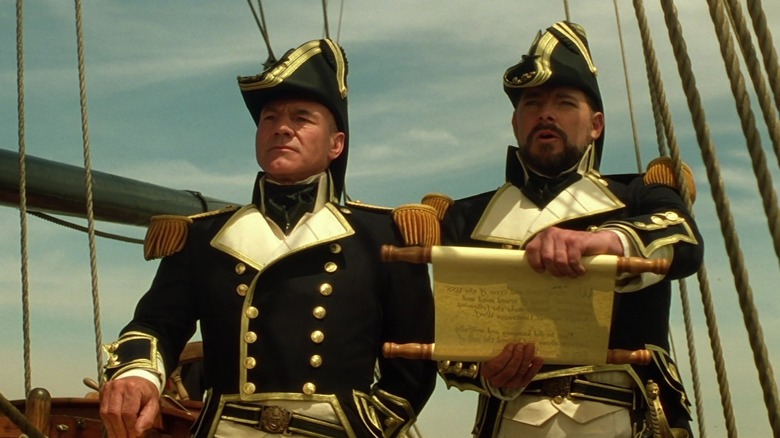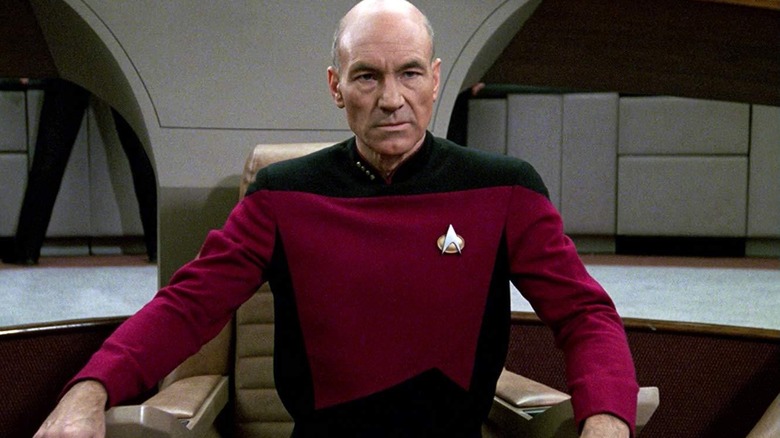Patrick Stewart Drew From A Number Of Sources To Create Star Trek's Captain Picard
If one were to broadly characterize each "Star Trek" show into a small handful of themes, one might say that the original "Star Trek" from 1966 is about bravery and balance. The characters are presented as bold — if not clumsy — frontiersman, frequently relying on their instincts and their brash confidence to escape difficult situations. Captain Kirk (William Shatner) often employs clever military tactics to outwit enemies. At the same time, he relies on the advice from his cold, emotionless first officer Spock (Leonard Nimoy) just as much as he relies on the passionate, angered responses of his very human medical officer Dr. McCoy (DeForest Kelley).
In contrast, "Star Trek: The Next Generation" is about the power of intellect, the importance of management skills, and the eternal solution of diplomacy. Captain Picard (Patrick Stewart) often asks for input from his entire senior staff, stands somewhat aloof, and celebrates ancient literature. Only occasionally did he let the façade slip and go riding in a dune buggy. One might say that "Star Trek," for all its cardboard artificiality, was the more natural show while "Next Generation" was more aggressively mannered.
This was a detail that Stewart latched onto when he was constructing Jean-Luc Picard for the first time. In terms of human details, Stewart knew that Picard was an English-speaking French man and that he preferred Earl Grey tea. It was up to the actor to construct a whole role out of those details, and he recalls — in his new autobiography "Making It So: A Memoir" — starting with the self-reminder that "Star Trek" took place in a sci-fi universe of the utmost formality. And what other characters had Stewart played that spoke in a mannered, formalized fashion? Why, the characters from Shakespeare, of course.
Other inspirations followed.
King Henry IV
Stewart noted that, for Picard, he "had to crack his code." The actor noted Picard's preference for Earl Grey tea kept him far away from Stewart's own Yorkshire hometown, but that wasn't a lot to go on. "How was I to find him within me," Stewart asked himself, "the way I had with Leontes and King Henry IV?" The comparisons to Leontes from "The Winter's Tale" and Henry IV gave him the connection he needed, writing:
"As has so often been the case in my life, William Shakespeare came to my rescue. I quickly came to understand that 'Star Trek' is not naturalistic television, especially where its captains are concerned. There is a formality to the way they speak and comport themselves that reminded me of numerous Shakespearean situations I'd been in onstage. I should play Jean-Luc, I realized, as if he were a character in Henry IV, which is about brave men."
That is, of course, one of the noblemen from "Henry IV," and not Prince Hal or Falstaff.
Stewart also received some additional inspiration directly from the show's creator Gene Roddenberry. Stewart knew all too well that Roddenberry wasn't fond of him, clearly preferring someone else to have played Jean-Luc Picard. The actor and the creator never really got along, despite a few lunches that the two shared. "These were awkward affairs," Stewart wrote, recalling a lunch wherein Roddenberry talked at length about golf, something he knew little about.
It was at one of these awkward lunches, however, that Roddenberry gave Stewart some very direct advice. The actor was asked if he had ever read the Horatio Hornblower novels.
Captain Horatio Hornblower
As luck would have it, Stewart was familiar with the adventure novels of C.S. Forester and wrote that he said back to Roddenberry:
"'I did, yes — when I was a teenager,' I replied. The publication of the Hornblower books, written by English novelist C. S. Forester, coincided with my childhood in the 1940s and '50s, and they were right up my alley — Horatio is a fictional officer in the nineteenth-century British Royal Navy who, thanks to his intelligence and daring, rises from a scrappy, unpromising background to the position of admiral. 'Read 'em all again,' Gene said. 'That's who Jean-Luc Picard is.'"
Stewart admits to being a little miffed at the assignment. He wanted to delve into the character via discussion and analysis, not through some homework. This was the opposite of working in the theater which is a more collaborative process. American television, he found through his characterization process, was lonely work.
As it so happens, though, that loneliness also became a key aspect of Picard's character. Stewart noticed that his character was aloof and spent a lot of time alone. The actor could use his research solitude to inform the personality of the good Captain. He wrote:
"[M]y solitariness had an upside, in that it pushed me into one aspect of Jean-Luc that I hadn't before considered: He is, by nature, a loner. In a sense, his job as captain, especially in the 'TNG' days, required this to be true. I might have leaned too hard into Picard's go-it-alone attitude in the early episodes, though. I have certainly made him a more open and accessible man over time ..."
But Picard's sternness came from one source very close to Stewart — his father.
Regimental Sergeant Major Alfred Stewart
Stewart does not have very rosy memories of his father and has revealed in public that, as a child, he was the victim of his repeated physical abuse. Stewart has said that when his father walked past, birds stopped singing. His father was a temperamental taskmaster who, he would later piece together, suffered from horrendous PTSD after his experiences at the evacuation at Dunkirk. Although Stewart had used Shakespeare and the theater to flee his abusive childhood, he turned back to his father for Jean-Luc Picard. When it came to military leaders, his father taught him that they are typically humorless and incredibly stone-faced.
Stewart wrote about his father's entrance into "Star Trek," as well as how his mother, a much warmer presence in his life, informed Picard's more human moments. He wrote:
"One additional and potent influence in shaping Jean-Luc was my father, Regimental Sergeant Major Alfred Stewart — from him, I drew Picard's stern, intimidating tendencies. But I like to think that my mother is in the captain, too, in his moments of warmth and sensitivity. They both live on through the character."
In the more recent episodes of "Star Trek: Picard," one can see how the character evolved from an aloof character to a more approachable, affable, grandfatherly figure. This evolution likely matched the changes Stewart himself, now 83, was also going through as a human being. It seems that we never stop growing up.



